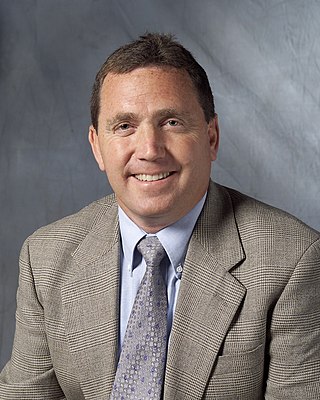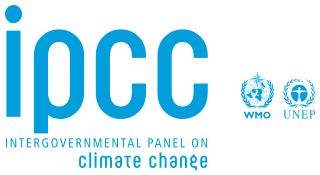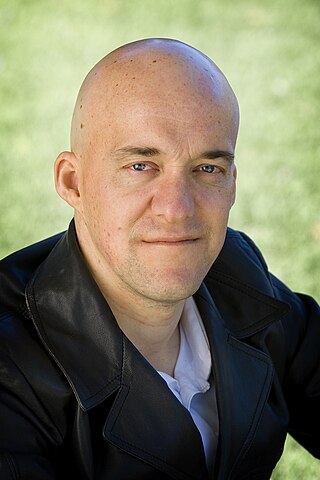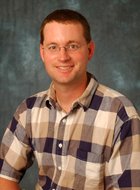
Benjamin David Santer was a climate researcher at Lawrence Livermore National Laboratory and former researcher at the University of East Anglia's Climatic Research Unit. He retired from the Lawrence Livermore National Laboratory in 2021 and is now a Distinguished Scholar in Residence at Woods Hole Oceanographic Institution. He also worked at the Max Planck Institute for Meteorology from 1987 to 1992. He specializes mainly in statistical analysis of climate data sets, and detection/attribution of climate change forcings.

The Intergovernmental Panel on Climate Change (IPCC) is an intergovernmental body of the United Nations. Its job is to advance scientific knowledge about climate change caused by human activities. The World Meteorological Organization (WMO) and the United Nations Environment Programme (UNEP) established the IPCC in 1988. The United Nations endorsed the creation of the IPCC later that year. It has a secretariat in Geneva, Switzerland, hosted by the WMO. It has 195 member states who govern the IPCC. The member states elect a bureau of scientists to serve through an assessment cycle. A cycle is usually six to seven years. The bureau selects experts to prepare IPCC reports. It draws the experts from nominations by governments and observer organizations. The IPCC has three working groups and a task force, which carry out its scientific work.

The IPCC Third Assessment Report (TAR), Climate Change 2001, is an assessment of available scientific and socio-economic information on climate change by the IPCC. Statements of the IPCC or information from the TAR were often used as a reference showing a scientific consensus on the subject of global warming. The Third Assessment Report (TAR) was completed in 2001 and consists of four reports, three of them from its Working Groups: Working Group I: The Scientific Basis; Working Group II: Impacts, Adaptation and Vulnerability; Working Group III: Mitigation; Synthesis Report. A number of the TAR's conclusions are given quantitative estimates of how probable it is that they are correct, e.g., greater than 66% probability of being correct. These are "Bayesian" probabilities, which are based on an expert assessment of all the available evidence.

Roger A. Pielke Sr. is an American meteorologist with interests in climate variability and climate change, environmental vulnerability, numerical modeling, atmospheric dynamics, land/ocean – atmosphere interactions, and large eddy/turbulent boundary layer modeling. He particularly focuses on mesoscale weather and climate processes but also investigates on the global, regional, and microscale. Pielke is an ISI Highly Cited Researcher.

Mark Lynas is a British author and journalist whose work is focused on environmentalism and climate change. He has written for the New Statesman, The Ecologist, Granta and Geographical magazines, and The Guardian and The Observer newspapers in the UK, as well as the New York Times and Washington Post in the United States; he also worked on and appeared in the film The Age of Stupid. He was born in Fiji, grew up in Peru, Spain and the United Kingdom and holds a degree in history and politics from the University of Edinburgh. He has published several books including Six Degrees: Our Future on a Hotter Planet (2007) and The God Species: Saving the Planet in the Age of Humans (2011). Lynas is research and climate lead for the Alliance for Science and is co-founder of the pro-science environmental network RePlanet. Since 2009 he has been climate advisor to former president of the Maldives Mohamed Nasheed, and he currently works to assist Nasheed with the Climate Vulnerable Forum, a group of the world's most climate-vulnerable 58 developing countries. He has co-authored a number of peer-reviewed scientific publications, including a 2021 paper which found that the consensus on anthropogenic climate change in the scholarly literature now exceeds 99%.
Energy & Environment is an academic journal "covering the direct and indirect environmental impacts of energy acquisition, transport, production and use". Under its editor-in-chief from 1998 to 2017, Sonja Boehmer-Christiansen, it was known for easygoing peer-review and publishing climate change denial papers. Yiu Fai Tsang became its editor-in-chief in May 2017.

The Kaya identity is a mathematical identity stating that the total emission level of the greenhouse gas carbon dioxide can be expressed as the product of four factors: human population, GDP per capita, energy intensity, and carbon intensity. It is a concrete form of the more general I = PAT equation relating factors that determine the level of human impact on climate. Although the terms in the Kaya identity would in theory cancel out, it is useful in practice to calculate emissions in terms of more readily available data, namely population, GDP per capita, energy per unit GDP, and emissions per unit energy. It furthermore highlights the elements of the global economy on which one could act to reduce emissions, notably the energy intensity per unit GDP and the emissions per unit energy.
Kenneth Caldeira is an American atmospheric scientist. His areas of research include ocean acidification, climate effects of trees, intentional climate modification, interactions in the global carbon cycle/climate system, and sustainable energy.

Ruth S. DeFries is an environmental geographer who specializes in the use of remote sensing to study Earth's habitability under the influence of human activities, such as deforestation, that influence regulating biophysical and biogeochemical processes. She was one of 24 recipients of the 2007 MacArthur Fellowship, and was elected to the United States National Academy of Sciences in 2006.
Tom Michael Lampe Wigley is a climate scientist at the University of Adelaide. He is also affiliated with the University Corporation for Atmospheric Research. He was named a fellow of the American Association for the Advancement of Science (AAAS) for his major contributions to climate and carbon cycle modeling and to climate data analysis, and because he is "one of the world's foremost experts on climate change and one of the most highly cited scientists in the discipline." His Web of Science h-index is 75, and his Google Scholar h-index is 114. He has contributed to many of the reports published by the Intergovernmental Panel on Climate Change (IPCC), a body that was recognized in 2007 by the joint award of the 2007 Nobel Peace Prize.

Barry William Brook is an Australian scientist. He is an ARC Australian Laureate Professor and Chair of Environmental Sustainability at the University of Tasmania in the Faculty of Science, Engineering & Technology. He was formerly an ARC Future Fellow in the School of Earth and Environmental Sciences at the University of Adelaide, Australia, where he held the Sir Hubert Wilkins Chair of Climate Change from 2007 to 2014. He was also Director of Climate Science at the Environment Institute.
Ted Nordhaus is an American author and the director of research at The Breakthrough Institute. He has co-edited and written a number of books, including Break Through: From the Death of Environmentalism to the Politics of Possibility (2007) and An Ecomodernist Manifesto (2015) with collaborator Michael Shellenberger.
The Breakthrough Institute is an environmental research center located in Berkeley, California. Founded in 2007 by Michael Shellenberger and Ted Nordhaus, The institute is aligned with ecomodernist philosophy. The Institute advocates for an embrace of modernization and technological development in order to address environmental challenges. Proposing urbanization, agricultural intensification, nuclear power, aquaculture, and desalination as processes with a potential to reduce human demands on the environment, allowing more room for non-human species.
Ozone depletion and climate change, or Ozone hole global warming in more popular terms, are environmental challenges whose connections have been explored and which have been compared and contrasted, for example in terms of global regulation, in various studies and books.
Reiner Grundmann, is Professor of Science and Technology Studies (STS) at the University of Nottingham and Director of its interdisciplinary STS Research Priority Group. He is a German sociologist and political scientist who has resided in the UK since 1997. Previous appointments include Aston University and the Max Planck Institute for the Study of Societies.

The contributions of women in climate change have received increasing attention in the early 21st century. Feedback from women and the issues faced by women have been described as "imperative" by the United Nations and "critical" by the Population Reference Bureau. A report by the World Health Organization concluded that incorporating gender-based analysis would "provide more effective climate change mitigation and adaptation."

Ecomodernism is an environmental philosophy which argues that technological development can protect nature and improve human wellbeing through eco-economic decoupling, i.e., by separating economic growth from environmental impacts.
Gemma Teresa Narisma was a Filipina researcher who served as the executive director of the Manila Observatory in the Philippines and Head of the Regional Climate Systems programme from 2017 to 2021. Narisma was also an associate professor of the Physics Department at the Ateneo de Manila University. She was an author of IPCC Sixth Assessment Report Working Group I.

Raymond Ward Arritt was an American agronomist whose research focused on agricultural meteorology. He taught at Iowa State University from 1993 until his death in 2018. At Iowa State, he was responsible for operating the meteorological data repository Iowa Environmental Mesonet. He was one of three Iowa State faculty who contributed to the fourth (AR4) Intergovernmental Panel on Climate Change (IPCC) assessment report, which led to the IPCC sharing the 2007 Nobel Peace Prize with Al Gore.
Joeri Rogelj is a Belgian climate scientist working on solutions to climate change. He explores how societies can transform towards sustainable futures. He is a Professor in Climate Science and Policy at the Centre for Environmental Policy (CEP) and Director of Research at the Grantham Institute – Climate Change and Environment, both at Imperial College London. He is also affiliated with the International Institute for Applied Systems Analysis. He is an author of several climate reports by the Intergovernmental Panel on Climate Change (IPCC) and the United Nations Environment Programme (UNEP), and a member of the European Scientific Advisory Board for Climate Change.











